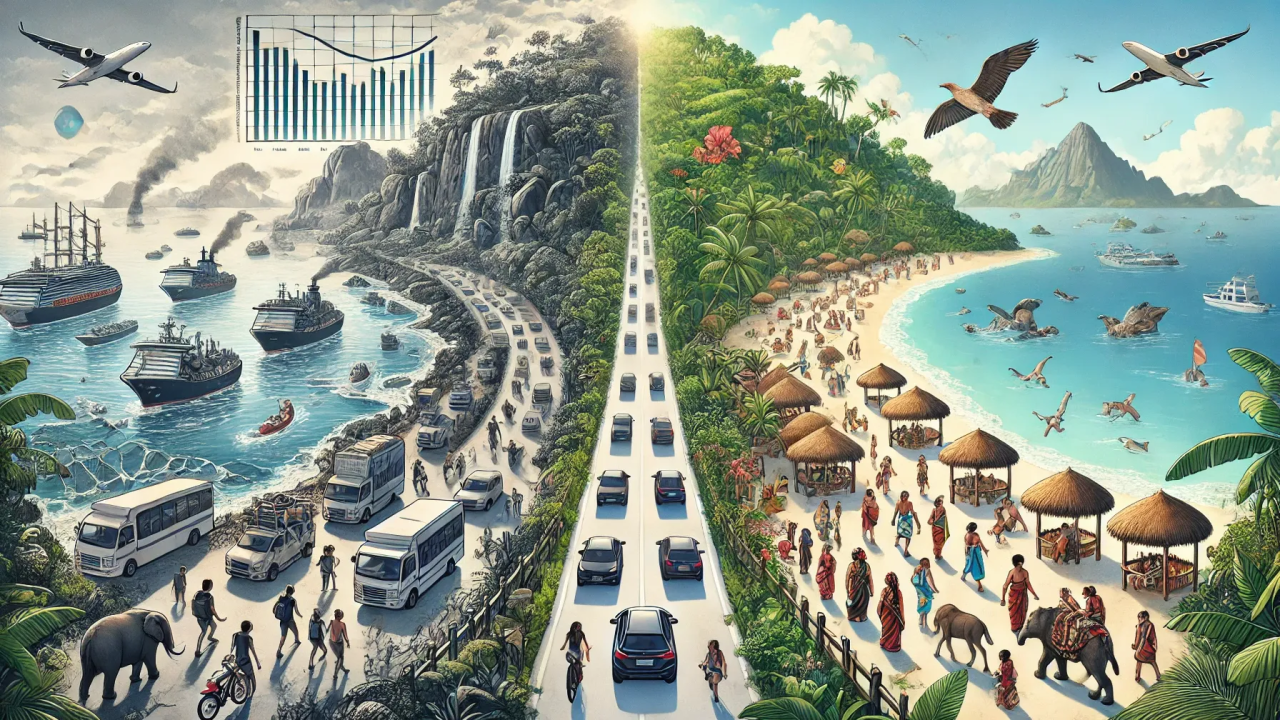Tourism has long been celebrated as a force for good—boosting economies, preserving cultural heritage, and fostering global connections. But beneath the glossy postcards and Instagram-worthy landscapes lies a troubling reality. The rise of mass tourism has led to overcrowded cities, environmental degradation, and cultural exploitation.
From the sinking streets of Venice to the eroding temples of Machu Picchu, the impact of tourism is undeniable. Can travel ever be truly sustainable? Or are we, as tourists, unintentionally destroying the places we love?
Let’s take a deep dive into the dark side of tourism, its consequences, and the ethical dilemmas it presents.
What is Over-Tourism?
Over-tourism occurs when a destination receives more visitors than it can sustainably handle, leading to:
- Overcrowding – Streets, landmarks, and public transport become congested.
- Environmental damage – Increased pollution, destruction of nature, and excessive waste.
- Cultural erosion – Local traditions, languages, and ways of life become commercialized or lost.
- Housing crises – Short-term rentals drive up rent, forcing locals out.
This issue is most visible in historic cities, fragile ecosystems, and small communities that struggle to cope with the sheer number of visitors.
1. Overcrowded Destinations & Their Struggles
Some of the world’s most iconic destinations are now suffering due to over-tourism.
🚣 Venice, Italy – A Sinking City
Venice, the city of canals, receives over 20 million tourists per year despite having a local population of just 50,000. The result?
- The city is literally sinking under the weight of tourism.
- Cruise ships cause damage to the delicate lagoon ecosystem.
- Locals are being pushed out as apartments are turned into Airbnbs.
Response: In 2021, Venice banned large cruise ships from its main canals, but is it enough?
🗻 Machu Picchu, Peru – Ancient Ruins Under Threat
The 15th-century Incan citadel was never designed to accommodate thousands of visitors daily. The impact?
- Erosion of ancient stone pathways due to excessive foot traffic.
- Uncontrolled tourism puts strain on local resources.
- The Peruvian government has restricted daily visitor numbers, but enforcement remains a challenge.
Dilemma: Should sites like Machu Picchu impose stricter regulations, even if it means limiting access?
🏝 Bali, Indonesia – Paradise Overrun
Bali, once a serene island paradise, now suffers from:
- Plastic pollution due to excessive tourist waste.
- Water shortages, with luxury resorts consuming vast amounts.
- Cultural commercialization, where traditions are reduced to staged performances.
Local backlash: In 2023, the Balinese government proposed restrictions on foreign tourists renting motorbikes due to reckless behavior.
2. Cultural Erosion & the Loss of Authenticity
Tourism transforms local traditions in both positive and negative ways. While it can promote cultural exchange, it often leads to commodification—turning culture into a performance for tourists.
🌍 The “Disneyfication” of Culture
As tourism increases, many destinations modify or dilute their traditions to cater to foreign visitors.
- Maasai Tribes in Kenya & Tanzania: Some Maasai villages have become staged attractions, where tribespeople perform dances on demand for tourists rather than for cultural significance.
- Thailand’s “Tiger Temples” & Elephant Rides: Many of these attractions exploit animals solely for tourist entertainment, often under cruel conditions.
- Japanese Geisha Culture: Once an elite, artistic tradition, the geisha experience is now packaged into photo shoots for tourists in Kyoto.
Dilemma: How can cultures preserve their authenticity while benefiting from tourism?
3. Environmental Destruction & Climate Impact
The tourism industry is one of the biggest contributors to climate change, responsible for 8% of global carbon emissions.
🛫 Air Travel & Carbon Footprint
- One long-haul flight emits more carbon per passenger than some people produce in an entire year.
- Popular tourist activities like helicopter tours, cruise ships, and ski resorts consume massive amounts of energy.
Possible solutions: Carbon offset programs, fewer flights, and eco-friendly transport options.
🏞 Natural Destinations Suffering from Over-Tourism
- The Great Barrier Reef (Australia) – Coral bleaching due to climate change and excessive diving tourism.
- Mount Everest (Nepal) – Once a symbol of adventure, now littered with trash and dead climbers due to commercialized expeditions.
- Maya Bay (Thailand) – The famous beach from The Beach movie was closed indefinitely in 2018 due to severe coral damage from over-tourism.
4. The Ethics of Tourism: Who Really Benefits?
🏨 Who Profits From Tourism?
Many travelers assume their money supports local communities, but in reality:
- Big corporations & foreign investors often own hotels, tour companies, and restaurants.
- Local artisans struggle as cheap, mass-produced souvenirs replace authentic crafts.
- Cruise ships contribute little to local economies since passengers eat and sleep onboard.
Ethical Dilemma: How can we ensure locals benefit from tourism, not just big businesses?
Can Tourism Ever Be Truly Sustainable?
While completely eliminating tourism isn’t the answer, there are ways to travel more responsibly.
✔ Solutions & Responsible Travel Practices
1. Choose Off-the-Beaten-Path Destinations
Instead of Paris or Bali, consider lesser-known places like:
- Slovenia instead of Italy
- Laos instead of Thailand
- Colombia instead of Mexico
2. Support Local Businesses
- Stay in family-owned guesthouses instead of chain hotels.
- Eat at locally-owned restaurants instead of global fast-food chains.
3. Travel in the Off-Season
- Avoid peak tourist months to reduce stress on local infrastructure.
- Enjoy a more authentic experience with fewer crowds.
4. Respect Local Culture & Environment
- Learn basic phrases in the local language.
- Follow Leave No Trace principles—don’t litter or disrupt wildlife.
- Dress appropriately and respect religious sites.
5. Reduce Your Carbon Footprint
- Take fewer, longer trips instead of frequent short vacations.
- Use trains & buses instead of domestic flights.
- Offset your carbon footprint with eco-friendly initiatives.

Leave a Reply